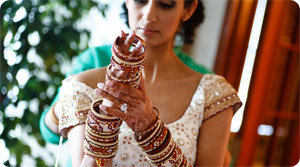Special Marriage Act

The main reason behind the enactment of the Special Marriage Act was to provide a special form of marriage for the people of India and all Indians residing in foreign countries, irrespective of the religion or faith followed by either party, to perform the intended the marriage. According to the Act, the bride and the groom shall observe any ceremonies for the solemnization of their marriage, provided they complete certain formalities that are prescribed for the marriage, by the Act.
The Special Marriage Act 1954 has proved to be beneficial for the NRIs, because it provides for the appointment of diplomatic and consular officers as marriage officers (registrars), for solemnizing and registering marriages between citizens of India, in a foreign country. The Special Marriage Act 1954 is applicable throughout India, except the state of Jammu and Kashmir. Check out the clauses of the Act in the following lines.
Special Marriage Act 1954
The Special Marriage Act states that a marriage between two persons can be legalized, only if the following conditions are satisfied at the time of marriage.
- Neither of the two has a spouse living, at the time of the marriage.
- Neither of the two is incapable of giving a valid consent to the marriage due to unsoundness of mind.
- Neither of the party has been suffering from mental ailments to such an extent, that they are unfit for marriage and the procreation of children.
- Neither party has been subjected to recurrent attacks of epilepsy or insanity.
- At the time of marriage, the groom should be of twenty-one years of age and the bride should be of eighteen years of age.
- Both the parties are not within the degrees of prohibited relationship; provided where a custom governing at least one of the parties permits of a marriage between them, such marriage may be solemnized, notwithstanding that they are within the degrees of prohibited relationship.
- If the marriage is solemnized in the State of Jammu and Kashmir, both parties should be the citizens of India, domiciled in the territories to which this Act extends.
- When a marriage is intended to be performed in accordance with the Act, the parties of the marriage shall give notice in writing, in the Form specified in the Second Schedule to the Marriage Officer of the district, where the marriage is going to be solemnized.
- The marriage shall be solemnized after the expiration of thirty days of the notice period that has been published under sub-section of the Act.
- At least one of the parties going to perform the marriage should have resided for a period of not less than thirty days, immediately preceding the date on which the notice for marriage is issued to the registrar.
- The marriage officer is bound to display the notice of the intended marriage, by affixing a copy to some conspicuous place in his office.
- If the marriage officer refuses to solemnize the intended marriage, then within a period of thirty days of the intended marriage, either party can prefer an appeal to the District Court, within the local limits of whose jurisdiction the marriage officer has his office. The decision of the District Court, regarding the solemnization of the intended marriage, shall be final.
| |
Other Categories
Arya Samaj Wedding
Christian Wedding Ceremony
Hindu Marriage Act
Muslim Wedding Ceremony
Indian Wedding Facts
Kanyadaan
Marriage Legalities in India
Sikh Wedding Rituals
Parsi Wedding Ceremony
Special Marriage Act
Muslim Marriage Act
Marriages in Different Religions
Famous Indian Weddings
Seven Vows Of Marriage
Indian Baraat
Wedding Photography
Main Categories
Indian Weddings
Wedding Decoration Tips
Pre Wedding Functions
Post Wedding Functions
Hindu Marriages
Indian Wedding Day Functions
Muslim Wedding Ceremony
Malayalee Wedding Ceremony
Kannada Wedding Ceremony
Kashmiri Wedding Ceremony
Oriya Wedding Ceremony
Tamil Wedding Ceremony
Bengali Wedding Ceremony
Punjabi Wedding Ceremony
Jain Wedding Ceremony
Maithil Brahmin Wedding Ceremony
Sindhi Wedding Ceremony
Telugu Wedding Ceremony
Maharashtrian Wedding Ceremony
Assamese Wedding Ceremony
Jewish Wedding Ceremony
Marwari Wedding Ceremony
Buddhist Wedding Ceremony
Gujarati Wedding Ceremony
Planning Your Honeymoon
Indian Bride
Indian Groom
Indian Wedding Features
Marriage Problems
Indian Wedding Preparation
Indian Wedding Planners
Post Wedding Preparation
Main Day Function
|

